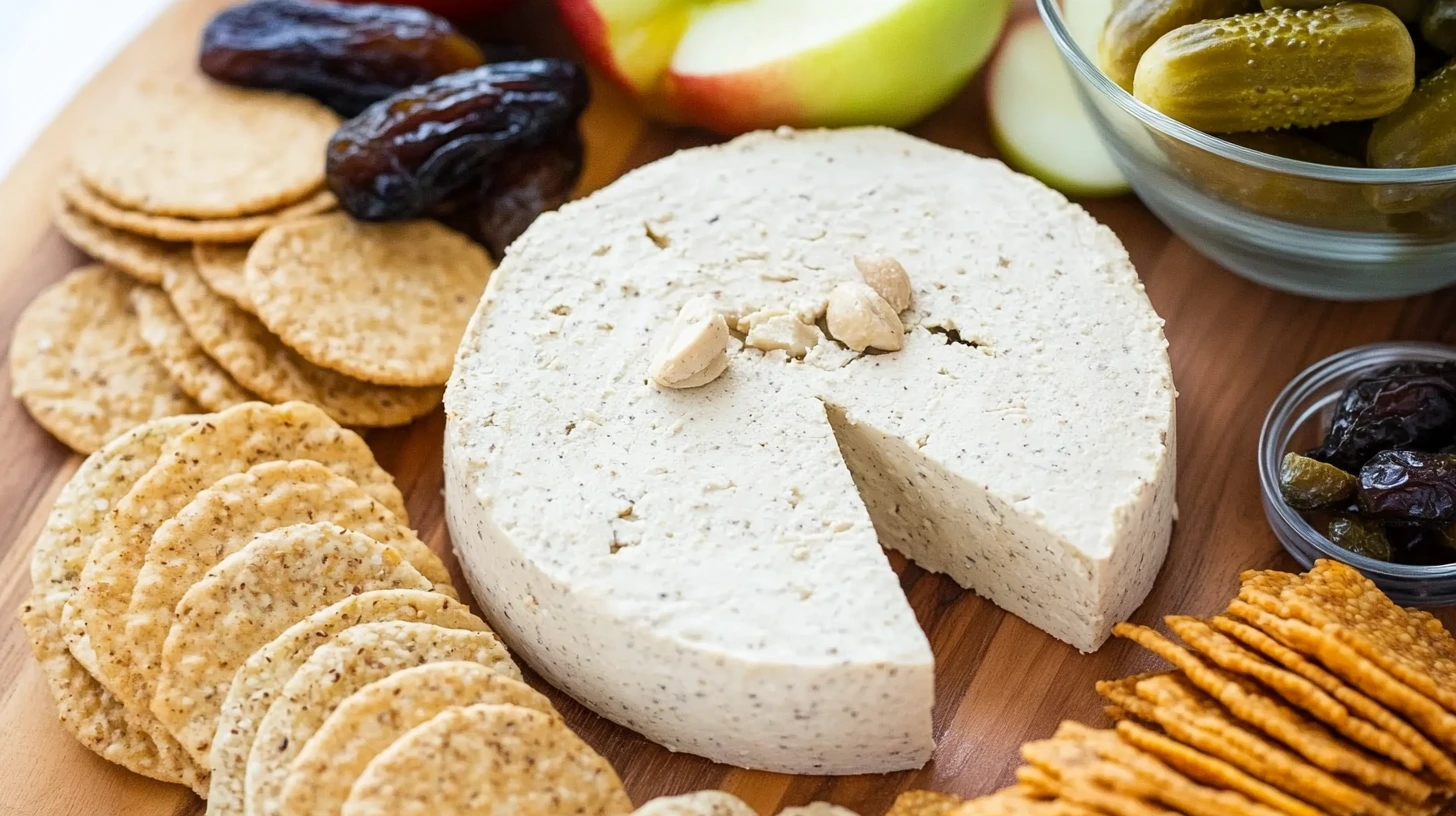Growing up, I always believed that cheese was irreplaceable. It was creamy, savory, and comforting. How could any alternative measure up? When I shifted to a paleo lifestyle, saying goodbye to cheese was one of the hardest parts. That is, until I started creating my own paleo cheese at home.
Inspired by my family’s tradition of cooking from scratch and the lessons passed down in Grandma Eleanor’s kitchen, I turned this craving into a creative challenge. I wanted something that tasted like cheese, felt like cheese, but respected the clean principles of a grain-free, dairy-free paleo diet. After a few delicious experiments and a little help from simple ingredients like cashews and nutritional yeast, I found the answer.
In this article, I’ll walk you through everything you need to know about paleo cheese, from why it’s different than vegan cheese, to how to make your own firm, sliceable version at home. We’ll also cover the best substitutes, recipes to try, and FAQs from readers who miss cheese just as much as I did.
Looking for inspiration? Try our paleo granola recipe to pair with a dairy-free breakfast bowl!
Click to Access the Table of Contents:
Table of Contents
What Is Paleo Cheese?
Why Regular Cheese Isn’t Paleo
Traditional cheese is made from cow, goat, or sheep milk, ingredients that are excluded from strict paleo eating. While real cheese is delicious and loaded with fat and protein, it also contains compounds like lactose and casein, which can cause inflammation and gut distress for many people.
In a paleo framework, foods should resemble what our ancestors might have eaten. Since dairy wasn’t part of their daily diet, modern paleo guidelines eliminate cheese, milk, and butter, though some flexible “primal” eaters may allow grass-fed ghee or aged goat cheese occasionally.
The Paleo Cheese Concept
So, what is paleo cheese? Simply put, it’s a dairy-free cheese substitute made from whole-food, paleo-approved ingredients. The most popular base is cashews, a soft, mild nut that blends into a creamy texture similar to cheese. When paired with flavor boosters like nutritional yeast (for that cheesy umami), garlic powder, lemon juice, and sometimes beef gelatin or agar for firmness, the result is shockingly close to the real thing.
Unlike most store-bought vegan cheeses that contain cornstarch, canola oil, or soy, paleo cheese recipes stick to nutrient-dense, real-food ingredients that fuel your body without compromising flavor.
In the next part, we’ll explore why cheese is such a gray area on the paleo spectrum and whether goat cheese has a place in your meal plan.
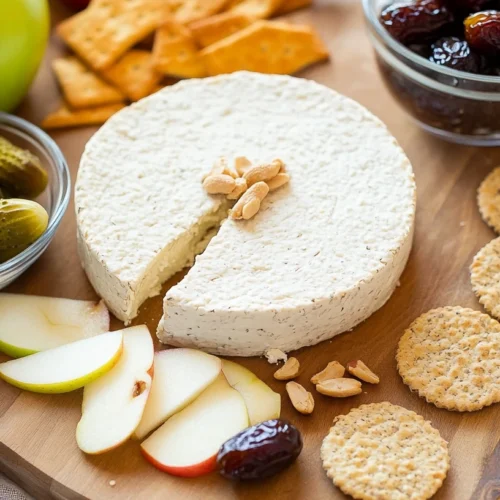
Paleo Cashew Cheese
EQUIPEMENTS
- Blender
- – Saucepan
- Bowl
- Plastic wrap
- Small mold or container
INGREDIENTS
- 1 cup raw cashews soaked for at least 4 hours
- ¼ cup nutritional yeast
- ½ teaspoon garlic powder
- 1 tablespoon lemon juice
- ¼ teaspoon smoked paprika optional
- Salt to taste
- 1 ½ tablespoons beef gelatin powder
- ¼ cup water plus 2 tablespoons for gelatin
INSTRUCTIONS
- Soak cashews in water for a minimum of 4 hours, then drain.
- In a high-speed blender, blend soaked cashews with 1/4 cup water, lemon juice, nutritional yeast, garlic powder, smoked paprika (if using), and salt until smooth.
- In a small saucepan, combine beef gelatin with 2 tablespoons of water and let sit for 5 minutes to bloom.
- Heat the gelatin gently over low heat, stirring until fully dissolved.
- Add the dissolved gelatin to the cashew mixture and blend again to combine.
- Line a small container or ramekin with plastic wrap. Pour the cheese mixture in, smooth the top, and cover.
- Refrigerate for at least 6–8 hours or overnight until firm and sliceable.
- Unmold, slice, and serve. Store leftovers in an airtight container in the fridge for up to 5 days.
NOTES
- For a firmer texture, use 2 tablespoons of gelatin.
- Add fresh herbs or cracked pepper for variation.
The Paleo Cheese Debate
Is Goat Cheese Paleo?
Technically, no. The paleo diet excludes all dairy, including goat cheese. However, some primal eaters allow it occasionally since it’s lower in lactose and easier to digest than cow’s milk. If you’re not sensitive to dairy and follow a flexible paleo approach, small amounts may work. For strict paleo, it’s best to skip it and stick with dairy-free alternatives.
Why Some Paleo Followers Still Eat Cheese
Some paleo followers include small amounts of grass-fed butter or fermented cheese for their healthy fats and probiotics, especially under the 80/20 lifestyle. But if you’re following paleo for gut healing or autoimmune support, stick to clean, nut-based or vegetable-based cheeses.
Is Vegan Cheese Automatically Paleo?
No. Most vegan cheeses contain soy, starches, and oils like canola that aren’t paleo-compliant. Always check the label, or better yet, make your own with minimal, whole-food ingredients.
Best Paleo Cheese Substitutes
Now that we’ve cleared up the dairy confusion, let’s talk about the fun stuff, real paleo cheese substitutes that are totally crave-worthy.
1. Cashew Cheese
Creamy, mild, and versatile, just blend soaked cashews with nutritional yeast, garlic, lemon juice, and salt. Add gelatin to make it sliceable.
2. Coconut Milk Cheese
Full-fat coconut milk, lemon juice, and agar make a smooth, spreadable option for wraps and dips.
3. Almond Cheese
Slightly grainier than cashew cheese, almond cheese has a nuttier bite. Blend with vinegar and herbs for a tangy spread.
4. Sweet Potato or Cauliflower Cheese Sauce
Blend roasted sweet potatoes or steamed cauliflower with garlic, lemon, and nutritional yeast for a creamy, paleo-friendly cheese sauce.
5. Nutritional Yeast
The ultimate flavor enhancer, nutritional yeast adds a cheesy, umami depth without any dairy.
How to Make Paleo Cheese at Home
The best thing about paleo cheese? You can make it yourself in less than 20 minutes (plus chilling time), with just a handful of ingredients. This version, inspired by Paleo Grubs, is creamy, savory, and firm enough to slice. Whether you’re new to dairy-free living or a seasoned paleo pro, this cheese will quickly become a staple in your fridge.
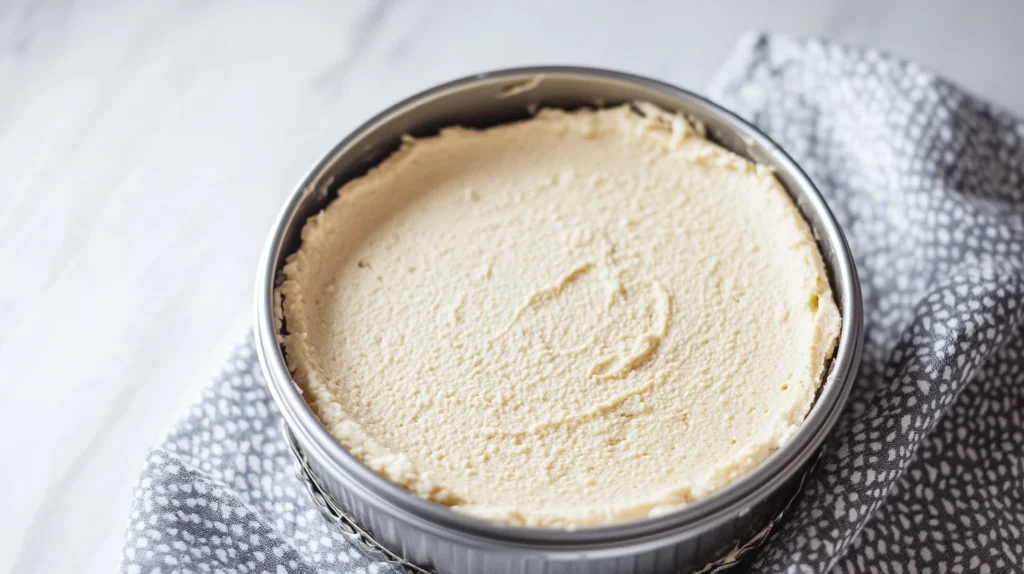
Ingredients:
- 1 cup raw cashews, soaked for 4+ hours
- ¼ cup nutritional yeast
- ½ tsp garlic powder
- 1 tbsp fresh lemon juice
- ¼ tsp smoked paprika (optional)
- Salt to taste
- 1½ tbsp beef gelatin powder
- ¼ cup water (plus 2 tbsp for the gelatin)
Instructions:
- Soak the Cashews
Add raw cashews to a bowl, cover with water, and let them soak for at least 4 hours or overnight. Drain before using. - Blend the Base
In a high-speed blender, combine the soaked cashews, ¼ cup water, lemon juice, nutritional yeast, garlic powder, paprika (if using), and salt. Blend until completely smooth. You may need to scrape down the sides. - Prepare the Gelatin
In a small saucepan, sprinkle beef gelatin powder over 2 tablespoons of cold water. Let it bloom for 5 minutes, then gently heat over low heat, stirring until fully dissolved. - Combine Everything
With the blender running, slowly pour the dissolved gelatin into the cashew mixture and blend again until evenly combined. - Set the Cheese
Line a ramekin or small container with plastic wrap. Pour the mixture in, smooth the top with a spatula, and cover. - Chill to Firm
Refrigerate for at least 6 to 8 hours, or overnight, until fully set and sliceable. - Serve and Store
Turn out onto a plate, peel away the wrap, and slice. Store leftovers in an airtight container in the fridge for up to 5 days.
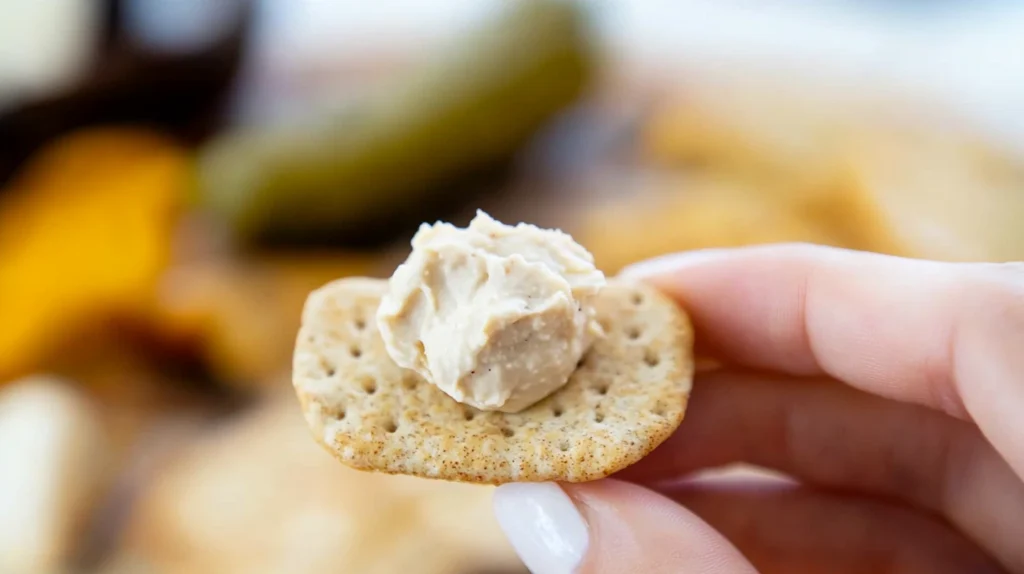
Tips for Success
- Want it firmer? Use a full 2 tablespoons of gelatin.
- For a spreadable version, skip the gelatin altogether.
- Add herbs like chives or rosemary for a savory twist.
Don’t miss our paleo caesar salad dressing, it pairs beautifully with sliced cashew cheese and fresh greens.
More Delicious Paleo Cheese Recipes
Once you’ve mastered basic paleo cheese, it’s easy to mix things up with fun, flavorful twists. Here are a few quick ideas to try.
Baked Paleo Mac and Cheese
Use steamed cauliflower or roasted sweet potato with cashew cheese sauce. Bake until golden and bubbly for a cozy, grain-free comfort dish.
Paleo Nacho Cheese Dip
Blend roasted sweet potato, jalapeño, garlic, and nutritional yeast. Add a splash of coconut milk. Perfect with veggie chips or tortillas.
Almond Cream Cheese
Soak blanched almonds, blend with lemon, vinegar, and sea salt. Chill until firm and spread over grain-free crackers.
Coconut Cheese Sauce
Mix coconut milk, tapioca flour, and nutritional yeast. Heat until thick. Add paprika or mustard for extra flavor.
Check out our dense bean salad recipe at LovinRecipes to serve alongside any of these paleo cheese dishes.
Store-Bought Paleo Cheese Brands to Try
While homemade is best for full control over ingredients, there are a few clean, dairy-free cheese products on the market that are suitable for those following a more flexible paleo diet.
Spero Foods
Made from sunflower seeds, Spero’s products are soy-free, dairy-free, and free from gums or starches. Their texture mimics cream cheese, and they come in flavorful options like smoked and herbed.
Treeline Cheese
Treeline’s soft cheeses are made from cashews and fermented with probiotics. They avoid processed additives and maintain a short ingredient list, making them a good choice for many paleo followers.
Miyoko’s Creamery (Select Products)
Not all of Miyoko’s cheeses are paleo-friendly, but some varieties use clean, whole-food ingredients and avoid starches. Always check the label for canola oil, gums, and added sugars.
What to Look For on the Label
To ensure your store-bought cheese is as paleo as possible, avoid these ingredients:
- Soy or pea protein
- Starches like potato or cornstarch
- Refined oils such as canola or safflower
- Natural flavors, gums, or thickeners
If the label lists only nuts, nutritional yeast, lemon juice, and herbs, you’re in safe territory.
For another great pantry-friendly option, discover our low FODMAP snacks at LovinRecipes, perfect with spreadable paleo cheese.
How to Add Paleo Cheese to Your Daily Meals
- Spread cashew cheese on grain-free crackers or veggie wraps
- Mix into zucchini noodles with olive oil and lemon
- Use in stuffed peppers or on top of baked sweet potatoes
- Serve with paleo egg scrambles or salads as a creamy topping
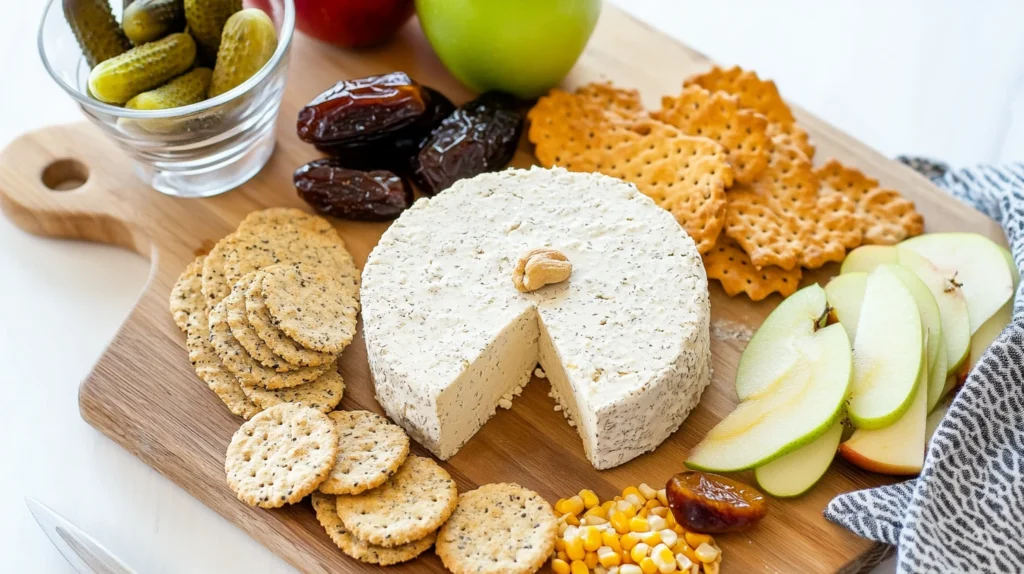
Keep a small batch in the fridge to quickly elevate any meal.
Common Mistakes to Avoid with Paleo Cheese
- Thinking all vegan cheeses are paleo, when many contain starches and oils
- Overeating nut-based cheeses, which are calorie-dense
- Storing cheese too long, homemade versions last 4 to 5 days in the fridge
Always read labels and keep recipes clean to stay truly paleo.
Conclusion
Giving up cheese doesn’t mean giving up comfort food. With the right ingredients and a little creativity, paleo cheese delivers everything you love: rich flavor, creamy texture, and serious satisfaction, without the dairy. Whether you’re blending cashews into a smooth spread, melting a coconut-based sauce over veggies, or slicing into your own homemade block, there are endless ways to enjoy cheese on a paleo diet.
Stick with clean, whole-food ingredients, avoid the additives hidden in store-bought options, and don’t be afraid to experiment. Paleo cheese isn’t just a substitute, it’s a fresh, flavorful upgrade.
Discover great ideas like our chopped almonds and Asian sauce recipe to pair with your next cheese-inspired dish.
FAQs About Paleo Cheese
What cheese is allowed on Paleo?
Strict paleo excludes all dairy. However, some flexible approaches allow grass-fed ghee or goat cheese in moderation.
What is a Paleo cheese substitute?
The best substitutes are cashew cheese, almond cheese, or sauces made from coconut milk or vegetables like cauliflower.
What tastes like cheese but isn’t cheese?
Nutritional yeast provides that cheesy flavor and is a go-to for all paleo cheese recipes.
Is goat cheese ok on a Paleo diet?
For strict paleo, no. But in primal or modified versions, it can be enjoyed occasionally if well-tolerated.

